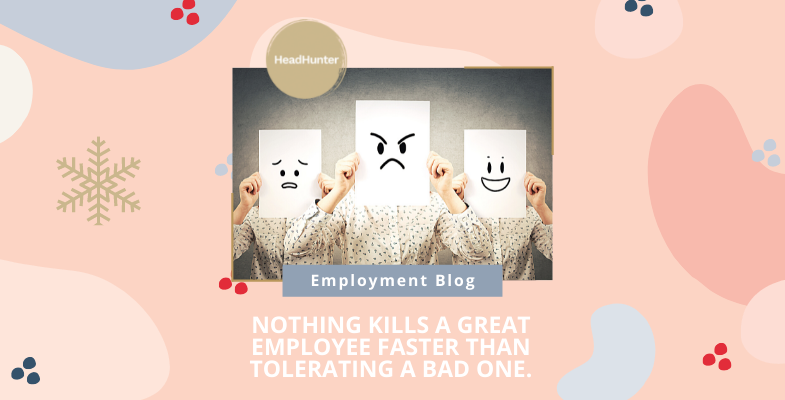Nothing kills a great employee faster than tolerating a bad one.
In a time where qualified people are hard to attract, it can be easy to settle for an employee who is perhaps doing the bare minimum or is a little toxic, but if you want to see your overall team performance and morale drop significantly, then don’t do a single thing about that employee. Nothing kills a great employee faster than tolerating a bad one, and sometimes even the most stringent performance management just doesn’t work.
We’ve all been there before, the candidate absolutely aced the interview and said all the right things but once they started on the floor, you notice some behaviours that are not in-line with what you expected.
Here are some common complaints that we hear about within our industry:
- Showing up late for work, or consistently running behind in their appointments
- Not helpful, or a team player.
- A little over-confident, behaving as though their team are beneath them.
- Not bothering to recommend or educate on any at-home care at all, regardless of how much the client needs it
- Overly competitive
- Closed off, and unresponsive
- Negative attitude, lack of passion and enthusiasm
- Poor personal presentation
- Dishonest about leave taken
- Gossiping about or bad-mouthing other team members or managers
- Refusing to take responsibility if they’ve made a mistake, or worse, blaming others
- Resisting change, new ideas, or initiatives
If you have established policies and procedures in place and outline them with team members in a formal induction, then you are setting the benchmark standard for your new employee to perform at. They will clearly understand what your boundaries are and if their performance is not in-line with those outlined standards, it’s very simple to gently remind them of your expectations, and their obligations, via structured performance management.

However, if you do not have those clearly outlined standards in place, it can become very difficult to manage and many business owners choose not to bother in the interest of avoiding any conflict.
But is it actually worth avoiding the conflict? High-performing, passionate and engaged employees will notice your lack of action and register that your standards and expectations are lower, even-worse, they will possibly start to exhibit the same behaviours.
If you have concerns about an employee’s performance, it’s important to do the following:
- Create a formal policy or procedure around your expectations in that specific area i.e. A policy around running late, and what needs to be done if you will be arriving late to work.
- Address the issue immediately.
- Existing policy in place? Remind them of the policy, and your expectations, and formalise your conversation.
- First time that they are learning about your expectations? Apologise for not being clear about them, let them know what you are expecting going forward, and formalise the conversation.
- If you see the performance issue repeated despite your efforts, it may be time consider formal warnings. Speak to your HR or legal support team about how to correctly manage this.
Addressing poor performance or behaviour that will impact your culture is essential in maintaining a happy team, and a flourishing business. It can be uncomfortable, but it’s worth it!
Keep up to date with the latest in employment and recruitment in the hair and beauty industries at the HeadHunter blog.

